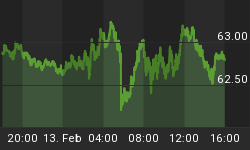It should now be clear to all Americans that our government is completely incapable of voluntarily reducing our fundamental problem of excess debt. The inability of Washington D.C. to address spending, even under the duress of a legal obligation to do so, is flagrantly obvious.
The sequestration, which is supposed to reduce our debt by $2.4 trillion over the next 10 years, is not the result of a curse brought to earth by an asteroid. It is a self-imposed act of congress to finally address our nation's habit of raising the debt ceiling with as much concern as a thief cares about getting a credit line increase on a stolen Visa Card. Isn't it ironic then that those same individuals who agreed on the sequestration a year ago are now doing back flips in order to undo their insufficient and feeble attempt at austerity.
The real issue here is the out of control spending on behalf of our elected leaders; and it can be proved. The deficit for November 2013 was $172 billion, which was up an incredible 25% from the level of last year. But, the reason for this significant increase in debt was not a lack of revenue. Government receipts were up $10 billion while outlays jumped by $44 billion. The truth is that the fiscal 2013 budget deficit is already up significantly from last year and it has nothing at all to do with a lack of revenue. Washington accepts the increased revenue with alacrity and uses it as a means to spend more instead of slowing down the rate of debt accumulation.
In addition, even if our leaders are indeed able to reduce the deficit by $2.4 trillion in the next decade, most of that proposed savings will be wiped out by increased debt service payments that are not currently incorporated into the rosy projections of the White House. Our "omniscient" leaders in D.C. predict that interest rates on the ten-year note will be just 5.3% by the year 2022. But if they are wrong on their base line projections; that is, if interest rates rise by just one point higher than predicted, $1.5 trillion of those proposed savings would be completely wiped away. That's because the average amount of outstanding publicly traded debt will be around $15 trillion over the course of the next decade (it is currently $11.6 trillion). A one hundred basis point increase in the average interest rate paid would erase 62.5% of those hoped for savings.
However, the Fed will be buying more than $1 trillion worth of the anticipated trillion dollar deficits each year for the foreseeable future. That means by the year 2016 the Fed's balance sheet will be have increased by nearly 100% and the amount of publicly traded debt will have soared by 200% since the start of the Great Recession in 2007. Therefore, it is highly likely that the average interest rate paid on government debt will be far higher than the 4.4% projected by the administration at the end of 2015, and the 5.3% going out a decade. After all, the surging supply of Treasury debt that is being monetized by the Fed should ensure inflation and interest rates rise well above their historical averages. That means the Ten-year note should rise well above its average rate of 7% going back 40 years. And that also means that deficits and debt will be significantly higher than anyone in D.C. expects. Given the above data, it is fairly certain that the U.S. government will be increasingly relying on the Federal Reserve to maintain the illusion of solvency in the future.
Indeed, most of the developed world finds itself in a similar situation. Central banks in Japan, Europe and the United States have expressed their goal to aggressively seek a higher level of inflation. They operate within insolvent governments that need to have their central banks purchase most if not all of their debt. Given the fact that these governments are racing towards both bankruptcy and hyperinflation, it would be foolish to store your wealth in Yen, Euros or Dollars.
Physical gold and PM equities have suffered greatly of late due to the threat of American austerity. There have also been liquidations from a major hedge fund that owns a tremendous exposure to precious metals. However, these temporary factors are almost behind us and have offered investors a wonderful opportunity to acquire exposure to gold equities at incredibly low prices, especially in light of the incredibly-dangerous macroeconomic environment.
















